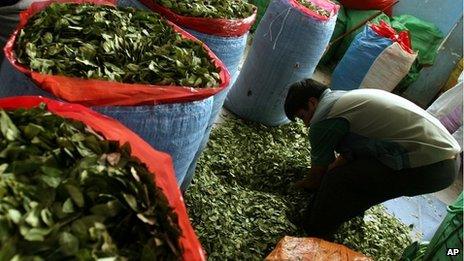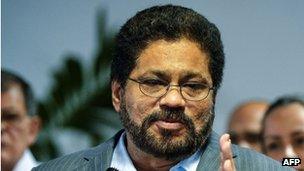Colombia's Farc proposes legal coca and marijuana crops
- Published

Coca leaves are part of Andean cultures in Colombia, Peru, Ecuador and Bolivia
Colombia's Farc rebels have called for some coca, poppy and marijuana cultivation to be legalised as part of land reform in the country.
The guerrillas' proposal came as they attended ongoing peace talks in Cuba with the Colombian government.
Legalisation of drug crops should be considered for therapeutic, medicinal, industrial or cultural reasons, Farc chief negotiator Ivan Marquez said.
Land use and ending drug trafficking are among the key issues at the talks.
The concentration of land was a major cause of the uprising that brought about the Farc's establishment in the early 1960s.
"We need to reorientate the use of land towards sustainable agricultural production," Ivan Marquez told reporters, as the Farc presented eight proposals for land reform.
This meant even considering "legalising some marijuana, poppy and coca leaf plantations for therapeutic or medicinal reasons, for industrial use or cultural ends," he added.

Senior Farc commanders are taking part in peace talks aimed at ending five decades of the conflict
Communities who grow such crops should not be criminalised and persecuted, the rebels said.
They called for an end to aerial spraying and other methods of eradicating drug crops.
The Colombian authorities have long accused the rebels of using money from drugs to fund the conflict. As part of the peace process, they want the Farc to help end drug trafficking.
However, analysts suggest that local Farc commanders who benefit from taxing drug producers are unlikely to readily give up a source of money.
Police security
The Farc delegation also urged the government to stop issuing new mining permits and oil exploration concessions.
They say these activities should be decreased to free up an area of at least 20m hectares (49m acres) of land for farming.
The Farc has already proposed that some 25m hectares - more than 20% of Colombian territory - be handed over to the country's poor.
The peace negotiations were launched in November in Cuba an attempt to end five decades of conflict.
On Wednesday, Colombia's police chief increased security at police stations after a wave of attacks by the Farc.
General Jose Roberto Leon Riano said intelligence services had issued alerts and other measures had been taken to prevent further deaths.
More than 10 policemen have been killed since the rebels suspended a two-month unilateral ceasefire on 20 January.
The Colombian government says it will only call a ceasefire when a final peace agreement has been signed.
- Published31 January 2013
- Published25 January 2013
- Published20 January 2013
- Published14 January 2013
- Published19 November 2012